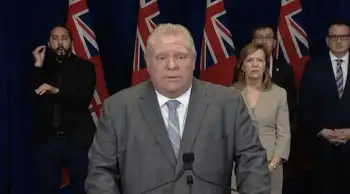Prosecutors in Enron case signal shifting approach to trial
HOUSTON, TEXAS - Since its collapse in late 2001, Enron has baffled investors and the public alike with its byzantine accounting and convoluted transactions, which reaped millions of dollars for executives and ultimately helped bring down the company.
But in recent weeks, government lawyers who will try the case against Enron's former chief executives, Kenneth Lay and Jeffrey Skilling, have signaled that they intend to spend less time befuddling jurors with talk of Enron's accounting.
Instead, at the trial set to begin Jan. 30 in Houston, prosecutors will focus more on charges that Lay and Skilling lied to investors, employees and accountants by painting a positive picture of the company's finances at a time when both men were selling Enron stock.
In its latest witness list, filed recently, members of the government's Enron Task Force deleted 17 witnesses who would have offered testimony on accounting matters. The witnesses removed include auditors and accounting managers from Enron and its outside auditor, Arthur Andersen, which also collapsed after being indicted for actions related to its work on Enron.
Still on the government's list are 65 witnesses, including a mix of Enron executives, credit analysts, energy traders, Enron board members and journalists.
The list includes Andrew Fastow, the former chief financial officer, who pleaded guilty in exchange for a 10-year sentence, and Ben Glisan Jr., Enron's former treasurer, who is serving a five- year sentence. But it does not include the former chief accounting officer, Richard Causey, who is cooperating with the government. Causey pleaded guilty in December.
The gradual shift away from technical charges that Enron executives cooked the books and concocted accounting schemes to enrich themselves reflects a government strategy, said lawyers not involved with the case, to focus on what jurors and the public at large can more easily understand: that the men at the top may have lied about Enron's condition and the risks it faced.
"The government is always, in white-collar cases, trying to prove lying, cheating and stealing," said Thomas Hagemann, a lawyer in Houston. "They are going to go to an area where they think they can most easily do that beyond a reasonable doubt."
Richard Schaeffer, a defense lawyer involved in one recent Enron trial involving the sale of barges in Nigeria, said that government prosecutors may have learned a lesson last summer when a judge declared a mistrial on all but a handful of 164 counts against five former Enron executives who were accused of overstating the strength of the company's broadband services division.
"Very often, trying to explain these types of accounting cases can be very boring, very confusing and very time-consuming to jurors," said Schaeffer. "Black and white issues like a defendant said something to someone are more easily appreciated and more quickly understood by a jury."
Daniel Petrocelli, Skilling's lead lawyer, said the shift indicated the prosecutors' realization that the case was weak on the accounting charges.
"As the government gets close to the trial they realize they have no accounting fraud case, so they are now moving away from it," Petrocelli said.
But Michael Ramsey, Lay's lead lawyer, offered a slightly different reason for the paring of the witness list. He said the government was eliminating witnesses who might dispute others' testimony, thus minimizing juror confusion.
Ramsey also noted that the government list did not include David Duncan, who had served as the lead partner for Arthur Andersen on the Enron account. He originally pleaded guilty, but after the Supreme Court overturned Andersen's conviction last May, Duncan sought last November to change his plea to not guilty. His request is pending with the court.
"If they don't call David Duncan, it will be a thunderous silence," Ramsey said.
Kathryn Ruemmler, the deputy director of the Justice Department's Enron Task Force, declined to comment.
The trial of Lay and Skilling is expected to last at least three months. Both are charged with conspiracy, fraud and insider trading, among other charges. Both have pleaded not guilty.
To prove its case against Lay, the government is seeking to dig deep into his tenure at Enron, the company he founded and, with Skilling's help, transformed from a once-staid pipeline business into a global energy-trading giant.
Related News

Cleaning up Canada's electricity is critical to meeting climate pledges
TORONTO - A new tool has been proposed in the federal election campaign as a way of eradicating the carbon emissions from Canada’s patchwork electricity system.
As the country’s need for power grows through the decarbonization of transportation, industry and space heating, the Liberal Party climate plan is proposing a clean energy standard to help Canada achieve a 100% net-zero-electricity system by 2035.
The proposal echoes a report released August 19 by the David Suzuki Foundation and a group of environmental NGOs that also calls for a clean electricity standard, capping power-sector emissions, and tighter carbon-pricing regulations. The report, written by Simon…




